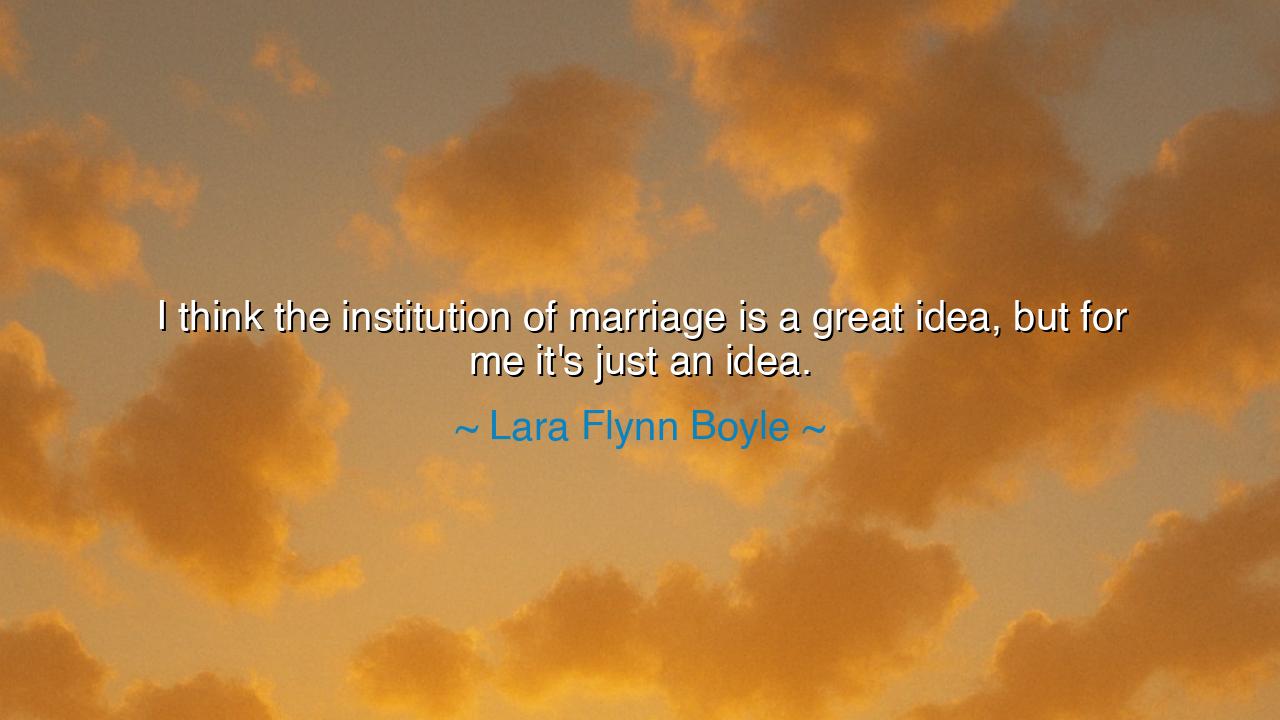
I think the institution of marriage is a great idea, but for me






In the timeless dance of human relationships, the institution of marriage has long been regarded as one of the cornerstones of society. Yet, Lara Flynn Boyle offers a powerful reflection on this sacred union: “I think the institution of marriage is a great idea, but for me it's just an idea.” In these words lies a deep tension between the ideal of marriage and the reality of personal choice, a tension that has been explored by the ancients and continues to resonate with us today. For Boyle, marriage exists not as a personal reality but as a concept, a social and cultural ideal that may or may not suit the path of every individual.
The ancients, particularly the Greeks, held marriage in high regard, but they also recognized that the bond between two individuals could be complex and multifaceted. Plato, in his writings, suggested that marriage was a key component of a harmonious society, yet he also acknowledged that individuals might find fulfillment in different forms of relationships. Socrates, the great philosopher, while married to Xanthippe, is often depicted as someone whose intellectual pursuits were far more central to his life than the conventional roles of husband or father. His relationship with Xanthippe was one of mutual respect but also an acknowledgment that not all individuals could or should conform to the same expectations of marriage. Socrates' life hints at a deeper truth: that the institution of marriage, while revered, may not be the ideal for everyone.
In Lara Flynn Boyle's statement, we find a modern echo of this ancient understanding. Marriage as an institution may be a noble and esteemed idea, but for some, it remains just that—an idea rather than a calling or a necessity. In the ancient Roman world, marriage was often seen not just as a personal bond, but as a legal contract between families, often arranged for political or social benefit rather than romantic love. The famed orator Cicero viewed marriage through a practical lens, understanding it as a means of securing alliances and consolidating power. Yet, even in such a world, figures like Catullus, the poet, expressed deep skepticism about the true nature of marriage, highlighting that it was not always the path to personal fulfillment.
Boyle's words underscore the idea that while marriage may work beautifully for some, it is not an absolute necessity for all to live a full and meaningful life. This reflects the evolution of societal norms around love and partnership. Consider the story of Catherine the Great of Russia, who rose to become one of the most powerful rulers in history, largely alone. Though she had several marriages and romantic entanglements, she famously pursued her own ambitions with little regard for the traditional expectations of marriage. Her reign was marked by her remarkable political acumen and leadership rather than the conventional expectations of a wife or mother. Catherine's legacy reveals that while marriage may be an important institution, it does not define the fullness of a woman's power, freedom, or capacity to lead.
The core of Boyle's quote invites us to reflect on the diversity of human experience. Marriage has long been celebrated as the highest form of partnership, but as Boyle suggests, it is not necessarily the defining aspect of one’s existence. There are many paths to fulfillment, and some may find their sense of purpose and happiness outside the traditional framework of marriage. The concept of personal freedom is woven throughout many ancient teachings. Aristotle, in his discussions of ethics, noted that individuals must pursue their own virtue in alignment with their own nature, not based on societal expectations alone. Just as he recognized that the good life could look different for different people, Boyle echoes this in her understanding that marriage is but one idea among many possibilities.
From these reflections, we are reminded that the institution of marriage is not a universal solution or requirement. For those who feel bound by its constraints, it is essential to recognize that their fulfillment does not need to be measured against this singular ideal. Instead, we must find our own paths to wholeness, whether through love, career, or other forms of connection. Let us remember that Catherine the Great, Socrates, and countless others have shown us that personal sovereignty—the ability to chart one’s course—is what truly defines the individual.
The lesson for us is clear: do not allow the institution of marriage to define your worth or limit your potential. If marriage is a path that resonates with you, walk it with open heart and commitment. But if, like Boyle, you find that it is an idea rather than a necessity, embrace that truth and live fully without the weight of societal expectations. The fullness of life is not bound by the conventional roles we are given, but by the authenticity with which we live. Let us take this wisdom into our lives, knowing that every path, every choice, has its own worth, and every journey is a valid and important part of the human experience.






AAdministratorAdministrator
Welcome, honored guests. Please leave a comment, we will respond soon